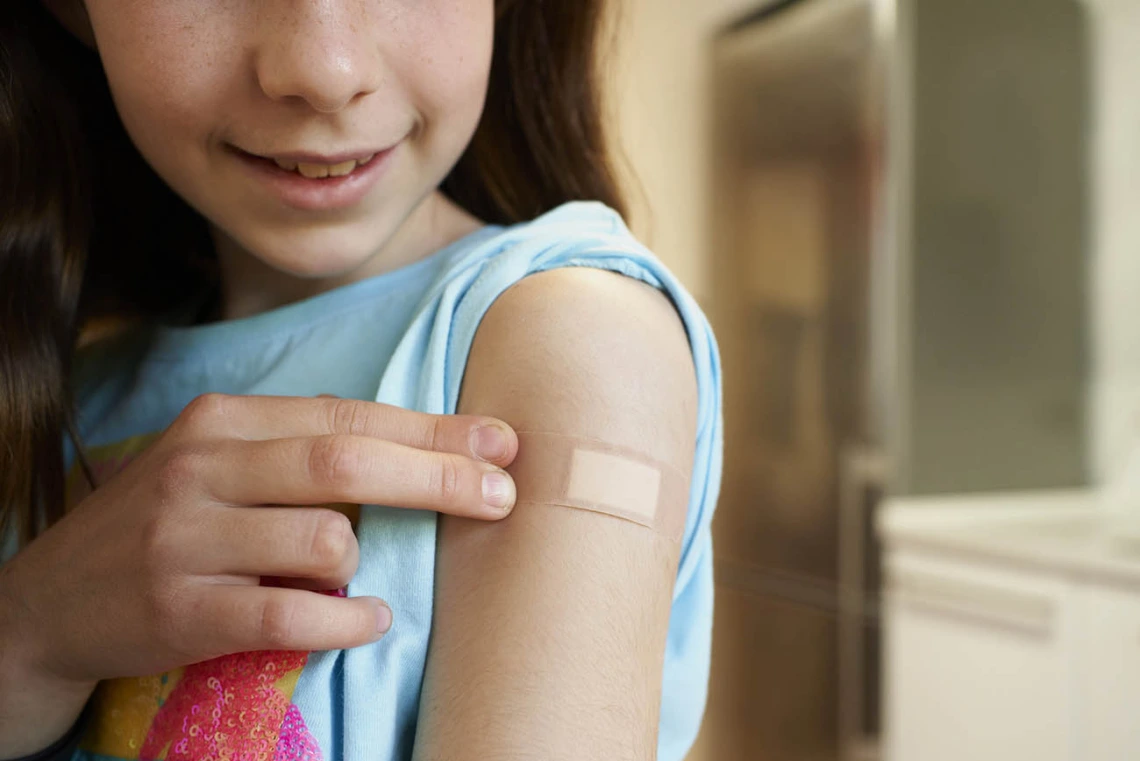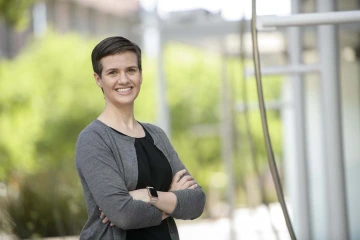COVID-19 Vaccine Protects Adolescents in Real-World Study
Data from the ongoing AZ HEROES study found that the COVID-19 vaccine is highly effective at preventing infection in Arizona teens.

Nearly 250 vaccinated and unvaccinated adolescents between the ages of 12 and 17 took part in the AZ HEROES study, which examined the effectiveness of the Pfizer-BioNTEch COVID-19 vaccine.
The Pfizer-BioNTech vaccine is 92% effective at preventing COVID-19 in children between the ages of 12 and 17, according to data from an ongoing population study led by researchers at the University of Arizona Health Sciences.
The findings were based on data from the Arizona Healthcare, Emergency Response, and Other Essential Workers Surveillance (AZ HEROES) longitudinal study and published Dec. 30 in the Centers for Disease Control and Prevention’s Morbidity and Mortality Weekly Report. The data was collected between July and December, when the delta variant was the predominant strain of coronavirus.

Karen Lutrick, PhD, is an assistant professor in the College of Medicine – Tucson’s Department of Family and Community Medicine.
A total of 243 study participants, ages 12-17, took weekly nasal swabs and answered surveys to track symptoms and measure risk of exposure. Of the 21 participants who tested positive, 16 were unvaccinated. None of the vaccinated participants who tested positive for COVID-19 sought medical care for their symptoms.
Dr. Lutrick, who collaborates with AZ HEROES investigators from the UArizona Mel and Enid Zuckerman College of Public Health, said observing adult and youth participants in real-world conditions differentiates studies like AZ HEROES from the highly controlled clinical trials pharmaceutical companies use to test vaccine safety and efficacy.
“For us to get similar numbers as those clinical trials is exciting,” Dr. Lutrick said. “We want vaccination to work as well in real-world situations — masked, unmasked, in the classroom, going to soccer practice — as it does in clinical trials.”
Children 5 years of age and older are eligible for the Pfizer-BioNTech COVID-19 vaccine. According to the Arizona Department of Health Services, 27.5% of Arizona’s children and teenagers have received at least one dose of the COVID-19 vaccine as of Dec. 22. Researchers say that with K-12 students back in the classroom, higher vaccination rates in this population could better protect against outbreaks among students, staff and teachers in schools.
“We need to increase vaccination rates so we can keep children in school, and this study provides even more evidence that the vaccine is safe and effective for children,” said Lynn Gerald, PhD, MSPH, Zuckerman Family Endowed Chair in Prevention and Lifestyle Medicine in the Zuckerman College of Public Health. “Our kids have missed out on so much these past 18 months, but if we can increase vaccination rates among school-age children, they can safely participate in school and all the other activities that are so important for their emotional and mental health.”
The AZ HEROES study tracks adults and children in real time to learn about COVID-19 infection and reinfection, symptoms and recovery, immunity and vaccine effectiveness. AZ HEROES initially enrolled health care personnel, first responders and other essential workers, but in July expanded to include children from 4 months to 17 years of age. Dr. Lutrick said the pediatric study would not have been possible without the enthusiastic participation of the community.
“Our participants came to us faster than we could ever anticipate. They’re so motivated, so dedicated,” she said. “Some of these parents have three or four kids and they’re putting the little swabs up their noses and bagging them up every Monday morning before school.”
In addition to Drs. Lutrick and Gerald, the AZ HEROES research team includes principal investigator Jeff Burgess, MD, MS, MPH, professor at the Zuckerman College of Public Health and member of the BIO5 Institute; Janko Nikolich-Žugich, MD, PhD, head of the College of Medicine – Tucson’s Department of Immunobiology and BIO5 Institute member; and College of Public Health faculty members Ed Bedrick, PhD, professor of epidemiology and biostatistics and BIO5 Institute member; Kate Ellingson, PhD, assistant professor of epidemiology and biostatistics; Joe Gerald, MD, PhD, associate professor in community, environment and policy; Purnima Madhivanan, PhD, MPH, MBBS, associate professor in health promotion sciences and BIO5 Institute member; and Xiaoxiao Sun, PhD, assistant professor of epidemiology and biostatistics and BIO5 Institute member. The study also involves collaboration with the Centers for Disease Control and Prevention, Abt Associates, the University of Utah Health, Texas A&M University College of Medicine, the University of Miami School of Medicine and the Marshfield Clinic Research Institute.
“It takes a village to run this study,” said Dr. Lutrick, who added that, as a Tucsonan, she is excited to see her home state adding to the national evidence base on COVID-19 vaccination. “A lot of people here in Arizona contributed to that data. These are our people. They’re our neighbors. It’s exciting watching our community come together.”
To learn more about the study, visit the AZ HEROES website.
Funding is provided in whole or in part by the National Center for Immunization and Respiratory Diseases, Centers for Disease Control and Prevention (75D30120R68013, 75D30120C08379).
Contact
David Bruzzese
520-626-9722
dbruzzese@arizona.edu
Stacy Pigott
520-539-4152
spigott@arizona.edu

